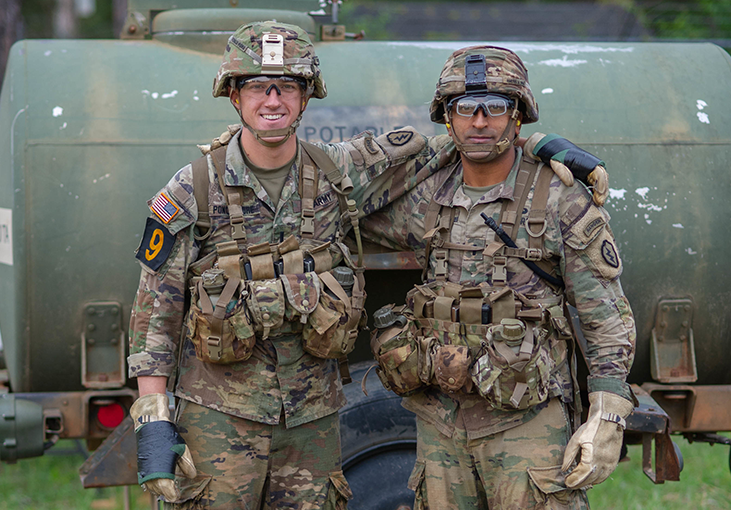How do your social fitness skills stack up? No matter how you scored on HPRC’s Social Fitness Self-Check, you can learn more about yourself and your social fitness skills using this reflection tool. Learning more about your social fitness skills can help you strengthen any areas in need of improvement, which can in turn boost your relationships, health, and ability to perform at your best. Take HPRC’s Social Fitness Self-check: Reflection and Next Steps below.
Published on: July 17, 2024
References
Allred, R. J., & Crowley, J. P. (2016). The “mere presence” hypothesis: Investigating the nonverbal effects of cell-phone presence on conversation satisfaction. Communication Studies, 68(1), 22–36. doi: 10.1080/10510974.2016.1241292
Altman, I., & Taylor, D. A. (1973). Social penetration: The development of interpersonal relationships. Holt, Rinehart & Winston.
Berger, C. R. (2005). Interpersonal communication: Theoretical perspectives, future prospects. Journal of Communication, 55(3), 415–447.
Britton, E. M., Marigold, D. C., & McGregor, I. (2024). Simple reflection exercises can build efficacy and reduce distress about relationship conflicts. Personal Relationships. doi/10.1111/pere.12545
Burleson, B. R. (2010). The nature of interpersonal relationships: A message-centered approach. The handbook of communication science, 145–163.
Cafaro, A., Glas, N., & Pelachaud, C. (2016). The effects of interrupting behavior on interpersonal attitude and engagement in dyadic interactions. Paper presented at the AAMAS. doi: 10.5555/2936924.2937059
Dickens, L. R. (2017). Using gratitude to promote positive change: A series of meta-analyses investigating the effectiveness of gratitude interventions. Basic and Applied Social Psychology, 39(4), 193–208. doi: 10.1080/01973533.2017.1323638
Floyd, K. (2014). Empathic listening as an expression of interpersonal affection. International Journal of Listening, 28(1), 1–12. doi: 10.1080/10904018.2014.861293
Gottman, J. M., & Gottman, J. S. (2015). Gottman Couple Therapy. In A. S. Gurman, J. L. Lebow, & D. K. Snyder (Eds.), Clinical Handbook of Couple Therapy (5th ed., pp. 129–160). New York, NY: The Guilford Press.
Gottman, J. M., & Silver, N. (2015). The seven principles for making marriage work (2nd edition). New York: Harmony Books.
Havaasi, N., Kaar, K.Z., & Zadeh, F.M. (2017). Compare the efficacy of emotion focused couple therapy and Gottman couple therapy method in marital burnout and changing conflict resolution styles Journal of Fundamentals of Mental Health, 20(1).
Heaney, C. A., & Israel, B. A. (2008). Social networks and social support. In K. Glanz, B. K. Rimer & K. Viswanath (Eds.), Health Behavior and Health Education: Theory, Research, and Practice (pp. 227–248). San Francisco, CA: Jossey-Bass.
Jug, R., Jiang, X. S., & Bean, S. M. (2019). Giving and receiving effective feedback: A review article and how-to guide. Archives of Pathology & Laboratory Medicine, 143(2), 244–250. doi: 10.5858/arpa.2018-0058-RA
McCarthy, R., Park, G. H., Barczak-Scarboro, N. E., Barrientos, S., Chamberlin, R., Hansom, A., & Messina, L. A. (2023). Social fitness and the social domain: A holistic approach based on Total Force Fitness. Journal of Special Operations Medicine. doi: 10.55460/trm7-423o
Metts, S. & Planalp, S. M. (2011). Nonverbal Signals. In M. L. Knapp, & J. A. Daly (Ed.), The Sage Handbook of Interpersonal Communication (4th ed.): Sage Publications.
Shaw, E. K., Howard, J., Etz, R. S., Hudson, S. V., & Crabtree, B. F. (2012). How team-based reflection affects quality improvement implementation. Quality Management in Health Care 21(2), 104–113. doi: 10.1097/QMH.0b013e31824d4984
Stafford, L. (2010). Measuring relationship maintenance behaviors: Critique and development of the revised relationship maintenance behavior scale. Journal of Social and Personal Relationships, 28(2), 278–303. doi: 10.1177/0265407510378125
Vanden Abeele, M. M., Hendrickson, A. T., Pollmann, M. M., & Ling, R. (2019). Phubbing behavior in conversations and its relation to perceived conversation intimacy and distraction: An exploratory observation study. Computers in Human Behavior, 100, 35–47. doi: 10.1016/j.chb.2019.06.004
Yang, M.M., Zhang, Y. & Yang, F. (2017). How a reflection intervention improves the effect of learning goals on performance outcomes in a complex decision-making task. Journal of Business and Psychology, 33(5), 579–593. doi: 10.1007/s10869-017-9510-0
